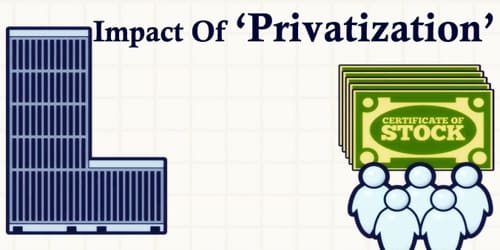Introduction: ‘Privatization’ is the process of shifting the public sector industries to the private sector. The decision for privatization is taken to lower the burden and role of the government in different industries. It affects the government in various ways. Government economics is impacted a great deal by way of privatization. Many developed countries such as France, Germany and the United Kingdom had already tried hands at it and it had proved to be successful in most cases. There are a number of reasons owing to which the government of a country takes the decision to privatize certain sectors.
‘Privatization’ was the first world nations that came up with the concept of privatization with the aim of improving the condition of services offered by certain industries besides lowering the burden of the government. Privatization has both positive and negative effects on a country. The impact has differed from industry to industry as well as country to country.
Positive Effects of Privatization –
Here is a look at the positive effect of privatization:
- Reduced Government Debts: One of the major positive impacts that privatization has had is that it has reduced the government’s debts.
- Improved Services: The service provided to the customers has improved a great deal owing to the competition among the private sector owners.
- New Kind of Products: In order to stay ahead of the competition, the private organizations try to come up with new and innovative products to meet the growing demands of the customers and create a foothold in the market.
- No Political Interference: With the shift from the public sector to the private sector, the interference of the political parties has been stopped in various industries.
- Competitive Rates: In the industries where the competition is high, the customers get the advantage of getting better services at lesser rates. In an attempt to increase their sales, the private owners provide goods and services at competitive rates.
Negative Effects of Privatization –
Here are the negative effects of privatization:
- Profit Making: The sole aim of the private owners is to make a profit and they try to attain it at any cost be it compromising the quality of the product, playing with the customer’s emotions or adopting other unfair means.
- Price Rise: In sectors, where there is less competition or monopoly of a private owner, the consumers need to shell a huge amount of money to buy goods and services. There is a rise in the prices and the customers have no choice but to pay the same.
- Rise in Corruption: Private owners adopt various means to get their tasks accomplished. They indulge in bribery, fraud and various other such ill practices that give rise to corruption.
- Lack of Transparency: In a democratic government, the public can question the government for the service provided by the public sector and the government is bound to show the clear picture. However, the private sector organizations are not bound by any such law and thus there is a lack of transparency.
- Ambiguity: Privatization has led to numerous choices with various sectors. The same goods and services are offered at different rates, quality and variety by different private sector owners thereby adding to the confusion of the customer.
Reasons for ‘Privatization’ –
Here are some of the main reasons for privatization:
- Better Services: Until a particular industry is under the public sector, it is governed by the government. There is no competition and no drive to perform better. The services offered are mostly average as there is no comparison and no threat of losing the race. However, when a particular industry goes to the private sector, the private owners are expected to set a bar for the quality they are expected to deliver. They work hard and try to give in their best else they are at risk of losing the task assigned to them and suffering immense loss. This ensures better service to the customers and has been one of the main reasons for privatization.
- Better Customer Support: Besides getting good service from the private sector employees, the consumers also get good customer support. The condition of the government-owned services in the country is known to all. The government employees are least interested in completing their tasks on time. Consumers need to call up over visit their offices several times in order to get their tasks done. However, this is not the case with the industries that have been owned privately. This is another reason why privatization was considered.
- Cope up with Budget Deficit: The government has a particular budget set for each industry. It requires accomplishing all its tasks within that particular budget. Many industries under the public sector had begun suffering from losses and faced budget deficit. In order to cope up with this problem, the government considered the option of privatization.
Conclusion: The decision of privatization of various sectors had been taken to lower the burden of the government and it has been successful in doing so. Thus, privatization has both positive and negative repercussions. While there are certain aspects in which the customers benefit owing to this shift, there are others wherein the customers have to suffer.
















